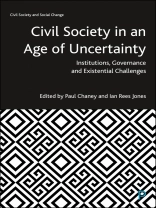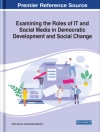This book explores how the uncertainties of the 21st century present existential challenges to civil society. These include changing modes of governance (through devolution and Brexit), austerity, migration, growing digital divides, issues of (mis)trust and democratic confidence, welfare delivery and the COVID-19 pandemic and the contemporary threat to minority languages and cultures.
Presenting original empirical findings, this book brings together core strands of social theory to provide a new way of understanding existential challenges to the form and function of civil society. It highlights pressing social issues and transferable lessons that will inform policy and practice in today’s age of uncertainty.
Inhoudsopgave
Chapter 1: Introduction – Locating Civil Society – Paul Chaney and Ian Rees Jones
Chapter 2: Existential Challenges – Paul Chaney and Ian Rees Jones
Chapter 3: Civil Society and the Governance of City Region Economic Development – David Beel, Martin Jones and Ian Rees Jones
Chapter 4: Civil Society, Pandemic, and the Crisis of Welfare: Exploring Mixed Economy Models of Welfare in Domiciliary Adult Social Care in a Devolved UK – Paul Chaney and Christala Sophocleous
Chapter 5: The Contemporary Threat to Minority Languages and Cultures: Civil Society, Young People and Celtic Language Use in Scotland and Wales – Rhys Jones, Elin Royles, Fiona O’Hanlon and Lindsay Paterson
Chapter 6: Digital Threat or Opportunity? Local Civil Society in an Age of Global Inter-Connectivity – Michael Woods, Taulant Guma and Sophie Yarker
Chapter 7: Democratic Decline? Civil Society and Trust in Government – Alistair Cole, Ian Stafford and Dominic Heinz
Chapter 8: Xenophobia, Hostility, and Austerity: European Migrants and Civil Society in Wales – Stephen Drinkwater, Taulant Guma and Rhys Dafydd Jones
Chapter 9: Meeting the Challenge? Prospects and Perils for Civil Society in the Twenty-First Century – Paul Chaney and Ian Rees Jones
Over de auteur
Ian Rees Jones is Professor of Sociological Research at Cardiff University and Director of the Wales Institute of Social and Economic Research and Data (WISERD).












